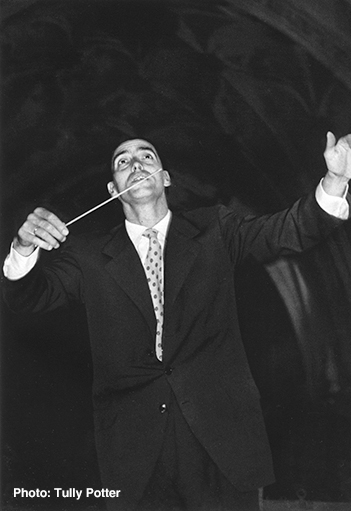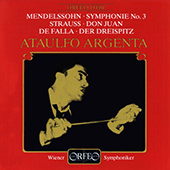Ataulfo Argenta
Ataulfo Argenta entered the Madrid Conservatory when he was thirteen years old, studying piano, violin and composition. He won two major prizes, the Premio Extraordinario for piano playing and the Kristina Nilsson Prize. These successes enabled him to continue his studies at a post-graduate level in Belgium. After returning to Spain he commenced working at the Madrid Opera in 1933, firstly as a répétiteur and then as second conductor. During the Spanish Civil War he was mobilised into the army of General Franco and did not resume his musical career until 1939. In 1941 he left Spain for the Conservatory at Kassel in Germany in order to recommence his musical studies, even though he was now married with two children.
In Germany Argenta gained the knowledge and experience that were harder to achieve in Spain, giving piano recitals and undertaking several conducting engagements. In addition he met the conductor Carl Schuricht, who encouraged him to pursue a career as a conductor. Having decided to return home in 1943 when conditions in Germany worsened during World War II, in 1944 he founded the Madrid Chamber Orchestra, and his career swiftly took off. In 1947 he was appointed chief conductor of the Spanish National Orchestra in Madrid. Musical standards at this time were not high in Spain, so a musician of Argenta’s abilities had many opportunities. He founded festivals at Granada and in his home town of Santander.
Argenta’s career started to take on an international dimension. He toured throughout Europe and South America, and was especially highly thought of in Paris, where he conducted both the Paris Conservatoire Orchestra and the Orchestre National, the principal French broadcasting orchestra. He also worked extensively in Glasgow with the Scottish National Orchestra and in Vienna with the Vienna Symphony Orchestra. He developed a special relationship with the Suisse Romande Orchestra, whose conductor Ernest Ansermet saw him as his natural heir. Argenta’s excessive workload however started to take its toll. In 1955, suffering from exhaustion, loss of weight and an internal infection, he was obliged to stop working for a year to recuperate. Shortly after he resumed his musical activities, at the beginning of 1958 he died as the result of an accident when running a car engine in an enclosed garage.
Argenta was a conductor of great presence, possessing a clear and communicative baton technique. Although a very demanding musician with orchestras, he treated players professionally and with respect. His recorded repertoire divided into two distinct halves. On the one hand he recorded much Spanish music, including highlights from nearly fifty zarzuelas or Spanish operettas, and music by his fellow countrymen Albéniz, Turina, Granados and Falla, including particularly distinguished readings of Falla’s opera El retablo de maese Pedro and his ballet El amor brujo. The other half of Argenta’s repertoire focused upon the principal works of nineteenth-century Romanticism. He led exciting versions of Liszt’s Faust Symphony and Les Préludes, Tchaikovsky’s Symphony No. 4, and Berlioz’s Symphonie Fantastique. In addition he accompanied Julius Katchen in Liszt’s Piano Concertos Nos 1 and 2 and Alfredo Campoli in Tchaikovsky’s Violin Concerto. These were all made with Decca, and several were early stereophonic recordings. He also recorded works by Schubert, Ravel and the contemporary French composer Maurice Ohana for the Club Français du Disque. One of his most long-lived Decca recordings has been a collection of music with Spanish connections by Rimsky-Korsakov, Chabrier, Moskowski and Granados entitled simply España.
© Naxos Rights International Ltd. — David Patmore (A–Z of Conductors, Naxos 8.558087–90).

















